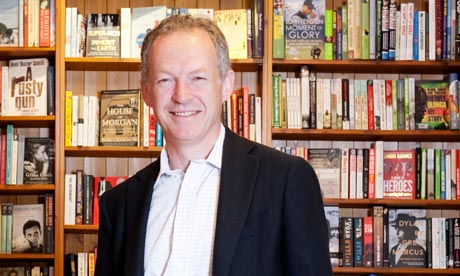
When you consider the prospects for literature in the age of the ebook, just four names seem to dominate the digital future: Amazon, Apple, Google and Microsoft. These American west coast giants, founded respectively in 1994, 1976, 1998 and 1975, are locked in a battle for audiences whose outcome no sensible person could predict. The future looks digital, but traditional books and booksellers still play an important role, possibly thanks to the war between these behemoths.
Last month, Microsoft challenged both Apple and Amazon with a $300m investment in Barnes & Noble, a stake in the digital operations of the world's largest bricks-and-mortar book chain to exploit and develop the Nook (the B&N e-reader) in direct opposition to the Kindle. Game on! And also an extraordinary reversal. Scarcely a year ago, industry analysts were suggesting that Barnes & Noble was doomed to follow another giant book chain, Borders, into administration.
Traditional bookselling, in other words, has more life left in it than meets the eye. In the UK, one bookseller who holds this view, James Daunt of Waterstones, is a retailer for whom the glass is distinctly half full. I sat down with him a few days ago to review the situation.
Daunt, approaching 50, has described Amazon as "a ruthless money-making devil". In private, he's less incendiary than steely, a rather clinical Cambridge-educated history graduate who had several years as a banker at JP Morgan before launching his eponymous London bookstore in 1990.
In July 2011, Daunt was appointed Waterstones MD by the new owner, Russian oligarch Alexander Mamut, accepting what many saw as a poisoned chalice.
After a difficult first year, Daunt claims he's beginning to see daylight. "People in publishing believe that books are recession-proof", he says, "but that's simply not true." Turning Waterstones round in double-dip recession UK has been uphill work. The company enjoyed a golden launch in the 1980s, but was subsequently mismanaged "by people who weren't booksellers, who made some idiotic decisions".
To make headway in an adverse, shape-shifting marketplace, Daunt says that he has implemented "a lot of quite simple, bookseller-y changes that have immediately made a difference". Selling books that readers actually want to buy was a start. Waterstones' London flagship stores, notably Piccadilly, Kensington, Notting Hill Gate and Hampstead, have been encouraged to be independent, within the strict guidelines laid down at head office. Daunt is a great believer in systems. He has also taken a tough line with the publishing community, scrapping the age-old policy of "returns", the semi-corrupt practice by which publishers effectively lent their books to the trade.
Waterstones has about 300 stores in the UK. Despite what many – including this column – have predicted, Daunt has not set out to close redundant outlets, despite some anomalies from the boom days. "In Norwich," says Daunt, "you could see a Waterstones branch from the front door of another Waterstones."
Daunt agrees that, while Waterstones has begun to recover, book publishing remains in a state of flux. "If everything stayed the same, we would be on course to win our customers back," he says. But this is the biggest IT revolution since Caxton. So what does a modern British bookseller do about Amazon, Apple et al? "When I took over last year," Daunt replies. "Waterstones was selling a range of e-readers, very badly. I stopped that instantly – at a considerable cost to the balance sheet." Does this mean he's the enemy of the ebook revolution that's sweeping down Main Street USA, and beginning to be felt here in the UK ?
Far from it. "I'm selling reading," says Daunt, who shares my view that, from many perspectives, this is a golden age for the consumer. "We have to insinuate ourselves into the process, and we have to be seamless." On closer examination, "seamless" turns out to mean persuading Waterstones customers to choose an e-reader (and ebooks) through a Waterstones-sponsored device. Daunt won't say when this will happen – "it's the bit we have to get right" – but it's imminent. "We'll be different from Amazon," he says, with characteristic ebullience, "and we'll be better."
In the UK, the e-reading revolution is about to get really competitive.
A stroke of genius
Stroke afflicts 150,00 people a year in the UK, but it rarely appears in literature. A notable exception is the death of Billy Bones at the beginning of Treasure Island. This gap has been filled by the publication of Interactions (Roast Books), a collection of short pieces by some distinguished writers with experience of stroke, headed by Seamus Heaney and Alan Ayckbourncorrect. The therapeutic idea behind this initiative is that live readings stimulate the minds and creativity of stroke patients, and can sponsor remarkable recoveries. The InterAct Reading Service enjoys the patronage of stroke survivor and theatre director Max Stafford-Clark, who also mobilises actors to read these remarkable stories. Hats off to a wonderful charity.

